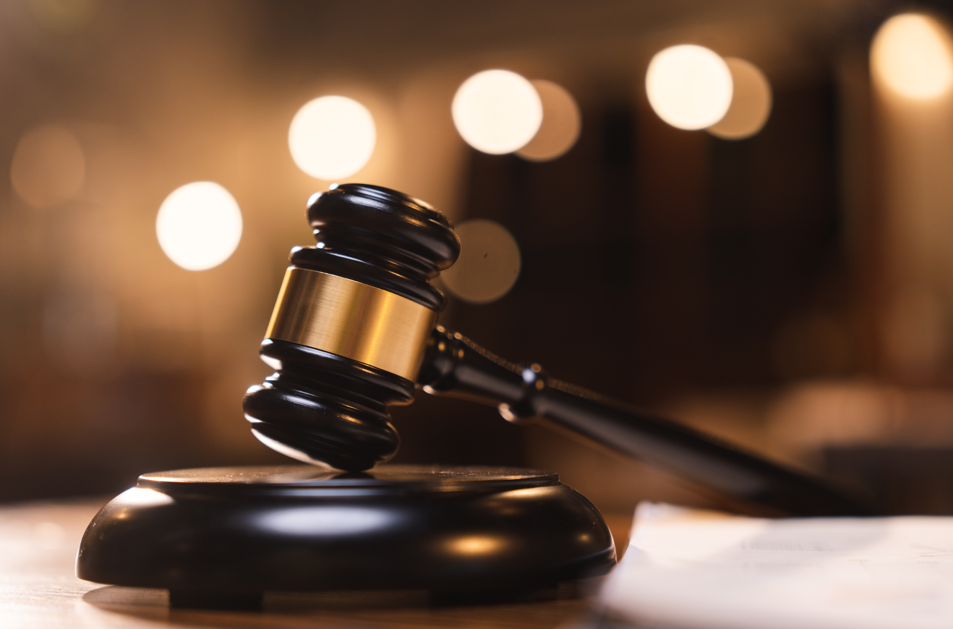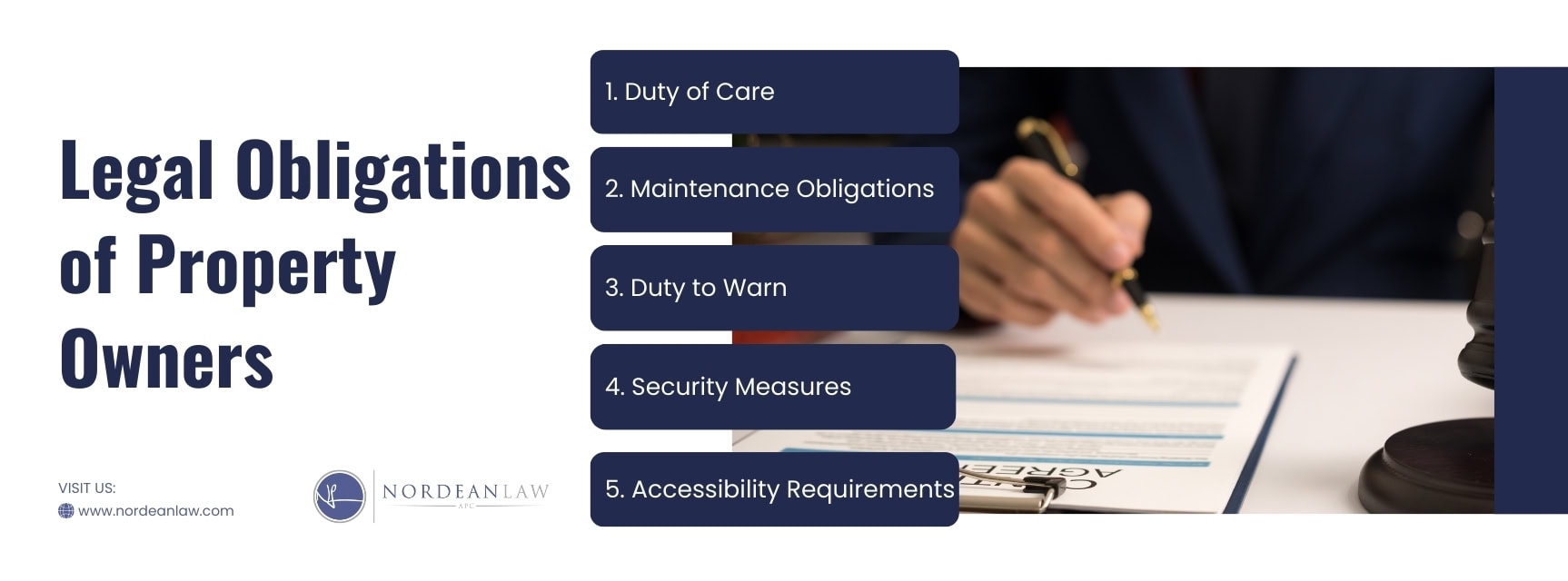Explore the nuances of Premises Liability Law in California. Learn how it impacts you and what steps to take if involved in a related incident.

At Nordean Law, we strive to keep our community safe. We pursue justice for the injured and we share critical information on how to keep you and your family safe.
Follow the link below for the best tips to prevent accidents of all kinds. If you have a specific question, or if you were injured in an accident, reach out to one of our attorneys today.
Premises liability law in California ensures all properties are safe for visitors, residents, and workers. It outlines the responsibilities of property owners to maintain a hazard-free environment and the rights of individuals who might be injured on their property. Nordean Law provides you with the complexities of your premises liability claim. Our premises liability lawyers in California help you receive the justice and compensation you deserve.
Premises liability law in California holds property owners accountable for injuries that occur on their property due to unsafe conditions. It applies to all property types, including homes, businesses, and public spaces. The duty of care a property owner owes to someone on their property varies based on the visitor’s status:
1. Invitees: Invitees, such as store customers, are guests the property owner invites for business purposes. The owner must ensure the premises are safe and alert guests to potential hazards.
2. Licensees: Guests for social reasons, not for the owner’s commercial benefit. The owner must warn of known dangers but isn’t required to inspect for unknown hazards.
3. Trespassers: Individuals who enter a property without permission. The duty of care owed to them by property owners is minimal, primarily to avoid intentional harm.
For more information on traffic-related risks, check out our article on supersized vehicles in America and their impact on pedestrian safety.

Property owners have a crucial duty to keep their premises safe for everyone who visits. California premises liability law covers several essential obligations that owners must uphold to avoid legal liability.
Property owners must actively maintain a safe environment. They should regularly check for hazards like slippery floors or broken pathways and take immediate action to fix them. It ensures visitors are safe from unnecessary risks.
Beyond identifying hazards, property owners must address and fix any issues swiftly. Whether it’s a leaky ceiling or unstable structures, prompt repairs are necessary to safeguard visitors’ well-being.
When immediate repair isn’t possible, property owners must mark the area as dangerous. Clear signage or barriers around the hazard area can make visitors aware of risks and prevent accidents.
For properties in areas prone to criminal activity, owners should implement reasonable security measures. It could involve adequate lighting, security cameras, or hiring security personnel. It may deter criminal acts and protect visitors.
Property owners are also responsible for ensuring their buildings are secure from foreseeable criminal acts. It includes adequate lighting, secure entrances, and, in some cases, security personnel to protect visitors from harm.
In California, premises liability cases arise when individuals are injured due to unsafe conditions on someone else’s property. Understanding the common types of premises liability cases helps you recognize your legal rights and property owners’ responsibilities.
1. Slip and fall accidents
Slip and fall accidents is the most common type of premises liability claims. These incidents often occur due to wet floors, uneven surfaces, or poorly maintained pathways. Property owners must ensure walkways are safe and free from hazards that could cause someone to trip or slip.
2. Dog bites
Dog owners can be held liable if their pet bites someone, regardless of the dog’s previous behavior. California premises liability law protects individuals from injuries caused by dogs, emphasizing the owner’s responsibility to control their pets.
3. Swimming pool accidents
Pools pose significant risks, especially to young children. Owners must secure pool areas to prevent unsupervised access and ensure safety measures to minimize the risk of drowning or injuries.
4. Amusement park accidents
While designed for fun, amusement parks can be the site of severe injuries due to ride malfunctions, operator errors, or inadequate maintenance. Park owners must maintain equipment and provide a safe environment for visitors.
In California, the party responsible for a premises liability accident could be anyone in control of the premises. These parties have to maintain a safe environment and could be held liable if their negligence leads to an injury.
1. Property owners: Typically bear the primary responsibility to keep their premises safe for visitors. It includes regular maintenance, prompt repairs of known hazards, and adequate warnings about potential dangers.
2. Tenants or lessees: In some cases, tenants or lessees who have control over a property or specific area within a property may be held responsible. It is especially true if their negligence contributed to the unsafe condition.
3. Property managers: If a property manager oversees a property’s maintenance and safety, California premises liability law can also hold them liable for the accident.
4. Maintenance companies: Companies contracted to for maintenance or repair work on a property can be responsible if they failed to carry out their duties properly and leads to an accident.
5. Manufacturers of defective products: If a premises liability accident is caused by a defective product (such as a malfunctioning gate or a poorly constructed staircase), the product manufacturer may be liable.
Determining responsibility often requires a thorough investigation into the circumstances surrounding the accident. A premises liability lawyer gathers evidence, interviews witnesses, and navigates the legal standards to build a strong case on your behalf.
Comparative negligence significantly influences the outcome of premises liability cases in California. It allows the court to assign a portion of the fault to the property owner and the injured person.
For instance, if an accident occurs because of a hazard on the property but the injured person was not paying attention, the court may decide both parties share some responsibility. The compensation amount is then reduced based on the percentage of fault.
In California, victims of premises liability accidents are entitled to compensation for three types of damages:
Economic damages are straightforward, covering financial losses directly resulting from the incident. These typically include:
Non-economic damages compensate for intangible losses, which are not easily quantifiable but significantly impact the victim’s life, such as:
In cases of egregious negligence or intentional harm, especially in wrongful death situations, courts may award punitive damages. These are not tied to direct or intangible losses but serve to punish the offender and deter similar future conduct. While not common, they underscore the legal system’s stance against gross negligence or malicious intent.
After a premises liability accident in California, taking the right steps is crucial for your safety and protecting your legal rights.
1. Seek medical attention: Prioritize your health. Even if injuries seem minor, some symptoms can appear days later.
2. Document the scene: Take photos of the accident site, including any hazards that contributed to the incident. Note the date and time.
3. Report the incident: Notify the property owner or manager immediately. Request a copy of the accident report if one is made.
4. Gather witness information: If there were witnesses, collect their contact details. Their accounts can be vital to your case.
5. Preserve evidence: Keep your clothing and any personal belongings affected by the accident as they are. Don’t wash or repair them until after your case is resolved.
6. Consult a personal injury attorney: A personal injury lawyer like Attorney Sam Nordean specialized in California’s premises liability law can guide you through the claims process and help you receive fair compensation.
Pursuing a premises liability claim in California centers on proving negligence. It involves demonstrating that the property owner failed to ensure the safety of the premises, leading to your injury. A seasoned California premises liability attorney can guide you through the process, building a strong case for a fair settlement.
Establish duty of care: Show that the property owner had a legal obligation to ensure the safety of the premises. The duty varies depending on whether you were an invitee, licensee, or trespasser.
Breach of duty: Demonstrate how the property owner failed to meet their duty of care. This could involve neglecting maintenance, failing to warn of dangers, or not taking reasonable steps to secure the property.
Causation: Link the owner’s breach of duty directly to your accident. You must prove that your injury resulted from the property owner’s negligence and not another cause.
Damages: Provide evidence of your injuries and losses from the accident. It includes medical expenses, lost wages, pain and suffering, and other relevant damages.
For further insights on significant legal outcomes, learn more about some of the record-setting personal injury settlements in the US and understand what makes them unique in terms of compensation and legal proceedings.
Understanding premises liability law in California is crucial for anyone injured on someone else’s property. It ensures that property owners maintain a safe environment for visitors, and holds them accountable if their negligence leads to your injuries. Whether you’re a victim of a slip and fall accident, a dog bite, or any other injury due to unsafe conditions, knowing your rights is the first step toward seeking justice and compensation.
Nordean Law specializes in premises liability claims, offering expert guidance and representation to help you receive the compensation you deserve. Contact us today and let our experienced team advocate for your rights and secure a favorable outcome for your case.
Comparative negligence in strict liability in California allows the court to reduce the plaintiff’s damages based on the percentage of fault contributing to their injury.
честные казино с быстрыми выплатамибездепозитные бонусы казиноиграть в лучшем казино на деньгибаза казино с бездепозитным бонусомонлайн казино Россииcasino oyunuThe premises liability duty in California requires property owners to maintain a safe environment for visitors. They must fix or warn about known hazards to prevent injuries.
Homeowner liabilities in California include maintaining a safe environment for visitors, repairing potential hazards, and warning of known dangers to prevent accidents and injuries on their property.
The duty of care in California is a legal obligation imposed on individuals to exercise a reasonable level of caution and prudence to avoid harming others.
The four conditions of negligence are the duty of care, breach of duty, causation (the breach caused the injury), and damages (actual harm resulted from the breach).
Negligence law in California requires proving that someone’s failure to use reasonable care harmed another person. It involves establishing duty, breach, causation, and damages.
Cases often subject to strict liability include those involving defective products, dog bites, and other situations where inherently dangerous or risky activities cause harm, regardless of negligence.
Strict liability law in California holds a party liable for damages without the need to prove negligence or fault. It is commonly applied in cases involving defective products and dog bites.